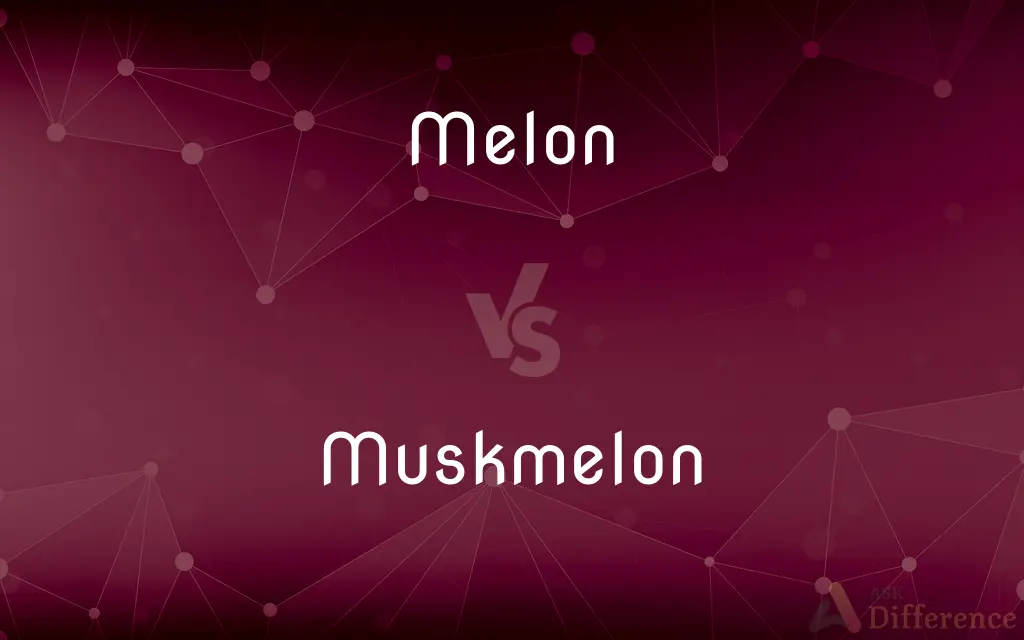Melon vs. Muskmelon — What's the Difference?
By Maham Liaqat & Fiza Rafique — Updated on April 3, 2024
Melons are a diverse group of fruit, offering various tastes and textures, whereas muskmelons specialize in sweet, musky flavors characteristic of cantaloupes and honeydews.

Difference Between Melon and Muskmelon
Table of Contents
ADVERTISEMENT
Key Differences
Melons encompass a broad category of fruits known for their large size and juicy interior, including watermelons and cantaloupes. Muskmelons, a subset of melons, are specifically known for their netted skin and sweet, fragrant flesh, making them distinct within the melon family.
While all melons thrive in warm climates, muskmelons have a particular affinity for hot, dry conditions which contribute to their concentrated sweetness. Other melon varieties, such as watermelons, prefer a mix of warm days and cool nights to develop their crisp, refreshing taste.
Melons, in general, offer a range of nutritional benefits including hydration and vitamins, whereas muskmelons are particularly rich in Vitamin A and Vitamin C, highlighting their nutritional differences.
Culturally, melons have been a part of various cuisines around the world, celebrated for their versatility in both sweet and savory dishes. Muskmelons, with their distinctive aroma and sweetness, are often favored in desserts, salads, and as fresh snacks.
In terms of texture, melons vary widely from the firm and crunchy to the soft and succulent. Muskmelons, on the other hand, are known for their tender, easily spoonable flesh that distinguishes them from other melon varieties.
ADVERTISEMENT
Comparison Chart
Varieties
Includes watermelon, cantaloupe, honeydew, etc.
Primarily cantaloupes, honeydews, and related varieties
Taste
Range from sweet to bland
Characteristically sweet and musky
Climatic Preference
Varied, depending on type
Prefer hot, dry conditions
Nutritional Content
Generally rich in vitamins and hydration
Especially high in Vitamin A and C
Usage in Cuisine
Versatile, used in both sweet and savory dishes
Often favored in desserts and as fresh snacks
Compare with Definitions
Melon
A large, juicy fruit with a thick rind and sweet flesh.
Watermelon is a popular melon enjoyed in the summer.
Muskmelon
A type of melon with sweet, musky flesh and a netted rind.
Muskmelon is often eaten for dessert in the summer.
Melon
Rich in hydration and vitamins.
Eating melon is a tasty way to stay hydrated on hot days.
Muskmelon
Preferably grown in hot, dry climates.
Muskmelons thrive in the warm summer months.
Melon
Cultivated in warm climates worldwide.
In many cultures, melons are grown as a staple summer fruit.
Muskmelon
High in Vitamin A and C.
Muskmelons are a good source of essential vitamins for eye health.
Melon
Used in a variety of dishes.
Chilled melon soup is a refreshing summer dish.
Muskmelon
Commonly used in salads and desserts.
A muskmelon salad with mint is a refreshing treat.
Melon
Varies widely in taste and texture.
The taste of melons can range from very sweet to almost tasteless.
Muskmelon
Known for its fragrant aroma.
The aroma of a ripe muskmelon can perfume an entire room.
Melon
A melon is any of various plants of the family Cucurbitaceae with sweet, edible, and fleshy fruit. The word "melon" can refer to either the plant or specifically to the fruit.
Muskmelon
Any of several varieties of the melon Cucumis melo, such as the cantaloupe, having fruit characterized by a netted rind and edible flesh with a musky aroma.
Melon
The large round fruit of a plant of the gourd family, with sweet pulpy flesh and many seeds
A slice of melon
A ripe melon will smell sweet
Muskmelon
The fruit of any of these plants.
Melon
The Old World plant which yields the melon.
Muskmelon
A type of melon, Cucumis melo subsp. melo, with sweet orange flesh and a rough skin resembling netting.
Melon
A waxy mass in the head of dolphins and other toothed whales, thought to focus acoustic signals.
Muskmelon
The fruit of a cucurbitaceous plant (Cucumis Melo) of the gourd family, having a peculiar aromatic flavor, and cultivated in many varieties, the principal sorts being the cantaloupe, of oval form and yellowish flesh, and the smaller nutmeg melon with greenish flesh. See Illust. of Melon.
Melon
Any of various vines of the family Cucurbitaceae, especially Cucumis melo or Citrullus lanatus, widely cultivated for their edible fruit.
Muskmelon
Any of several varieties of vine whose fruit has a netted rind and edible flesh and a musky smell
Melon
The fruit of any of these plants, having a hard rind and juicy flesh.
Muskmelon
The fruit of a muskmelon vine; any of several sweet melons related to cucumbers
Melon
A fatty structure in the forehead of cetaceans, especially the toothed whales, thought to be used in the production of high-frequency sounds.
Melon
Melons Vulgar Slang A woman's breasts.
Melon
(countable) Any of various plants of the family Cucurbitaceae grown for food, generally not including the cucumber.
Melon
Genus Cucumis, various musk melons, including honeydew, cantaloupes, and horned melon.
Melon
Genus Citrullus, watermelons and others
Melon
Genus Benincasa, a winter melon
Melon
Genus Momordica, a bitter melon
Melon
(uncountable) Fruit of such plants.
Melon
(uncountable) A light pinkish orange colour, like that of some melon flesh.
Melon
Breasts.
Melon
The head.
Think! Use your melon!
Melon
A member of the Green Party, or similar environmental group.
Melon
(countable) A mass of adipose tissue found in the forehead of all toothed whales, used to focus and modulate vocalizations.
Melon
(chemistry) The result of heptazine being polymerized with the tri-s-triazine units linked through an amine (NH) link.
Melon
Of a light pinkish orange colour, like that of melon flesh.
Melon
The juicy fruit of certain cucurbitaceous plants, as the muskmelon, watermelon, and citron melon; also, the plant that produces the fruit.
Melon
A large, ornamental, marine, univalve shell of the genus Melo.
Melon
Any of numerous fruits of the gourd family having a hard rind and sweet juicy flesh
Melon
Any of various fruit of cucurbitaceous vines including: muskmelons; watermelons; cantaloupes; cucumbers
Common Curiosities
What distinguishes a muskmelon?
Muskmelons are characterized by their sweet, musky flavor and netted rind, falling under the melon category but with specific traits.
Are cantaloupes and muskmelons the same?
Cantaloupes are a type of muskmelon known for their ribbed, net-like rind and sweet flesh.
Why are muskmelons especially good for eye health?
Muskmelons are rich in Vitamin A, which is crucial for maintaining good eye health.
Can melons be grown in any climate?
While melons prefer warm climates, some varieties can be cultivated in temperate zones with the right care.
How do melons contribute to hydration?
Melons have a high water content, making them ideal for hydration, especially during hot weather.
What makes muskmelons a popular choice for desserts?
Their sweet, musky flavor and tender flesh make muskmelons a favorite for fresh desserts and fruit salads.
Can melon seeds be eaten?
Yes, melon seeds from certain varieties are edible and can be roasted for a nutritious snack.
What is a melon?
A melon is a large, fleshy fruit with a thick rind, belonging to the Cucurbitaceae family, varying in taste and texture.
Can all melons be eaten raw?
Yes, all melons can be enjoyed raw, highlighting their fresh, juicy flavors.
Do muskmelons and other melons have the same nutritional benefits?
Muskmelons and other melons share some nutritional benefits, like hydration and vitamins, but muskmelons are particularly high in Vitamin A and C.
Are there any health risks associated with eating melons?
Eating unwashed melons or those stored improperly can pose health risks due to bacteria, so it's important to handle and prepare them safely.
Are melons used in any savory dishes?
Yes, certain melon varieties are used in savory dishes, adding a sweet and fresh component to salads and entrees.
Is there a best time of year to buy muskmelons?
The best time to buy muskmelons is during their peak season in the summer months, when they are most flavorful.
How can you tell if a melon is ripe?
A ripe melon often has a fragrant smell at the stem end and may yield slightly to gentle pressure.
How should melons be stored?
Unripe melons can be left at room temperature to ripen, while ripe melons should be refrigerated to maintain freshness.
Share Your Discovery

Previous Comparison
Rate vs. Speed
Next Comparison
Enhance vs. EnchanceAuthor Spotlight
Written by
Maham LiaqatCo-written by
Fiza RafiqueFiza Rafique is a skilled content writer at AskDifference.com, where she meticulously refines and enhances written pieces. Drawing from her vast editorial expertise, Fiza ensures clarity, accuracy, and precision in every article. Passionate about language, she continually seeks to elevate the quality of content for readers worldwide.















































